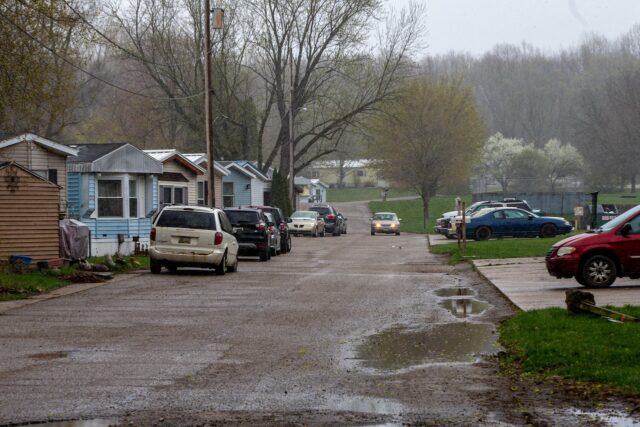Big-pocketed investors have built a thick portfolio of Michigan mobile home parks – with one in 10 now owned by private equity firms.
In recent years, mobile home parks across the country have been purchased by investors at a rapid pace. But a new tracker released this week by the Private Equity Stakeholder Project, a watchdog group, reveals the full scope of private equity’s stake in manufactured housing.
“It’s just been a real increase,” said Jordan Ash, housing director for the Private Equity Stakeholder Project. “They’ve definitely been much more aggressive in terms of acquisition over the last decade.”
The tracker shows 11 private equity firms own 1,095 parks nationally, with a disproportionate number in Michigan, which ranks second – between Florida and Texas – for mobile home parks owned by private equity-backed companies, despite being 13th for the total number of parks. There are 109 Michigan parks with 33,115 lots now under private equity control. A map shows most are scattered across a thick band in the Lower Peninsula.
“There’s a real concentration,” Ash said.
Related: A hedge fund bought Michigan mobile home parks. Things fell apart.
It’s unclear exactly why Michigan is at the top of the list, but some of the largest private equity mobile park owners have high numbers in the state.
YES Communities, which is owned by Stockbridge Capital Partners in a joint venture with global investors, has more than a quarter of its lots in Michigan. Havenpark Capital, operating as Havenpark Communities, has 28% of its lots here. And Alden Global Capital, which Ash says has been on an “enormous acquisition spree” as Homes of America, has 13% of its lots in Michigan.
Almost half the private equity acquisitions were supported by federally backed lenders Fannie Mae and Freddie Mac, according to the Private Equity Stakeholder Project. Some of these firms are public about their investments, while others like Alden Global Capital have been quietly buying up parks under different LLCs.
“It’s really hard to know who owns an individual park, but then also to really get a sense of the entirety of it, how large it is and how many parks they own,” Ash said.
The Private Equity Stakeholder Project is a nonprofit watchdog organization that looks at the impact of private equity in climate, labor, health care, surveillance, detention and housing.
Related: Mobile home residents would rather pay for bottled water than trust the tap
Private equity, which has grown rapidly seeing a 60% increase in funds over the past five years, works by pooling money from investors to buy a company, restructure it and sell for a profit.
An infusion of cash and private equity’s involvement can help companies improve operations and boost their value. But critics say private equity ownership has led to higher rents in housing, market concentration in healthcare and shrinking employment in retail.
“The private equity business model, although not all companies follow this exactly, is also about short term profits,” Ash said.
At mobile home parks, there’s been a track record of companies raising rents, tacking on fees and cutting back on maintenance.
Reporting has documented these impacts in Iowa, New York, Colorado, Tennessee and across the country. In Michigan, residents at parks owned by Havenpark Capital and Alden Global Capital previously told MLive about climbing rents and deteriorating conditions.
Havenpark Capital, which owns 15 parks in Michigan, has previously pointed out how it’s been able to invest in its communities. The company most recently put $600,000 toward upgrades at Swartz Creek Estates in Genesee County and poured $12 million into improving River’s Edge in Macomb County.
Related: ‘Price-fixing cartel’: Big Michigan mobile home park owners accused of conspiracy
For Karen Siebert, 70, who has lived at Woodland Ridge in South Lyon for the past six years, her rent normally increased between $20 and $25 a year. But after Windward Communities, owned by Green Courte Partners, bought the park last year, her lot rent jumped $50. It’ll go up another $33 this year.
It’s frustrating for Siebert to not know what her rent will look like from year to year.
“At this rate, I probably have another six to eight years here. I’m just not going to pay that kind of rent, so I’ll start over at another park or I’ll buy a small home or condo,” she said.
Windward Communities did not immediately respond to a request for comment.
Steep rent increases can be particularly burdensome for mobile home park residents because many are retired, low-income or disabled. And if someone can no longer afford the rent, it can be tricky to move because mobile home park residents own the house but rent the land.
Related: Michigan mobile home park residents feel stuck as rents climb
Paul Terranova, Midwest community organizer for advocacy group MHAction, says the private equity model selects “folks who are vulnerable, who have fewer resources and are on some level trapped and cannot move their homes.”
It can cost thousands of dollars to move a manufactured house, and some aging homes would fall apart if relocated.
“It’s really hitting people really hard who have the least,” Terranova said.
As private equity and corporate owners snap up more mobile home parks across Michigan, some advocates are now pushing a package of bills to update the state’s manufactured housing law.
Senate Bills 486–492 would only allow “justifiable” rent increases, require leases and update licensing standards. The legislation would also close a loophole in oversight of drinking water at parks as some residents rely on bottled water.
The Senate Committee on Housing and Human Services advanced the bills this week to be considered by the full Senate.




